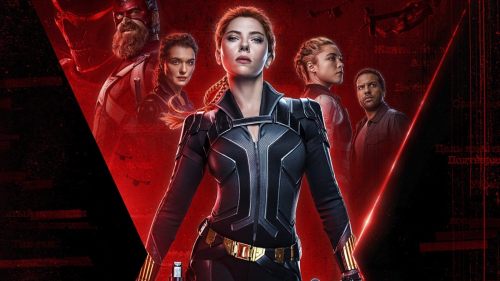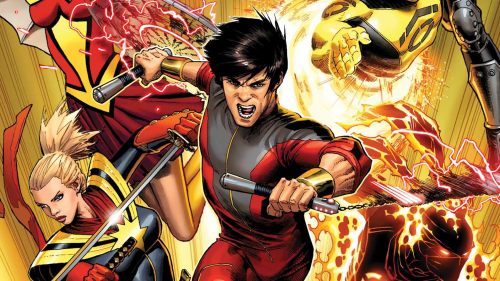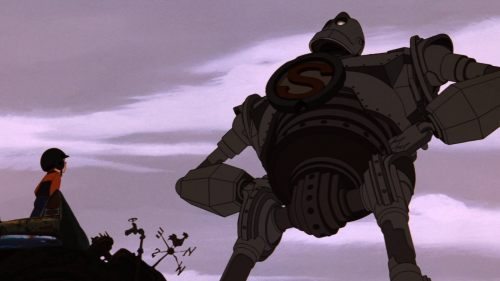Nebula & Gamora: Tackling Abuse In GUARDIANS OF THE GALAXY VOL. 2
Spoilers for Guardians of the Galaxy Vol. 2
“All you wanted was to win. All I wanted was a sister.”
The rotating roster of Marvel teams allows for a deeper exploration of once-supporting players. Much like Avengers: Age of Ultron made the previously minor Hawkeye and Black Widow an integral part of its text, so too does Guardians of the Galaxy Vol. 2, shifting its focus to the likes of Yondu, who Scott has already elaborated on, as well as Nebula and Gamora. Not only that, it turns its sister act up a notch, imbuing these warrior women’s violent sibling rivalry with a very real sense of anguish, even fleshing out the “Mad Titan” Thanos in the process. For all its messy flaws and occasionally compartmentalized action and humor, the one thing that works best about the cosmic sequel is its penchant for family drama. For my money, it's the best studio film of its kind since the first Guardians of the Galaxy, if not the best since Fast Five.
Even before the sisters collide on Ego’s Planet, Nebula establishes the kind of relationship she and Gamora shared. As children, everything was a competition set into motion by their cruel adoptive father. Thanos is even introduced in the first Guardians as he dismisses Nebula, saying he prefers Gamora right in front of her. Gamora was always the victor. Always the favourite. Always the more capable fighter. Having lost to her at the end of the first film despite following her father’s orders, Nebula begins this larger yet simultaneously more intimate sequel in much the same position. She’s Gamora’s prisoner, but as soon she’s given the opportunity to turn on the Guardians, she flies right into danger to settle a long-standing score.
The hatred she has for Gamora comes to a head when they finally do battle on Ego, as Nebula reveals the real reason for her sisterly scorn. After they were ripped from their birth families as children, their new home was a violent one. Thanos was an abusive father, turning these young girls against one another for sick entertainment, making them compete to survive. Every time Nebula lost, Thanos replaced a part of her with a cybernetic enhancement to make her as capable as her sister, a process that continued until she was mostly machine. She doesn’t even break the same as Gamora, who gets winded and wounded when injured. Instead she contorts herself back into form, un-twisting the mechanical mess that remains of her body, revealing but a thin line between what she’s become and what little humanity remains.
She blames Gamora for this. How can she not? Raised to believe her sister was the reason she was unmade, Nebula focuses all her anger on finally gaining the upper hand. But even Gamora only did what she had to in order to survive. They were raised in the same abusive environment, made to inflict pain on one another for Thanos’ amusement, and the nature of their abuse only ever allowed them to see each other as enemies.
One of the unfortunate hallmarks of growing up in an abusive household is anger built up in the long run. When you’re raised alongside other kids, especially ones who are just as vulnerable, they can become an outlet for all that frustration. If there’s perceived preferential treatment in the context of that abuse, the effect ends up compounded. The tools used to raise us are the often the tools we learn to use ourselves, including physical abuse and emotional manipulation. The one-two punch of having to compete for approval, and in this case literally compete to survive, is what turns Nebula and Gamora into bitter rivals, but it’s amidst the climax of their potential mutual destruction that they finally break down, realizing they’ve always been in the same boat. For as much as fellow abused siblings can be the object of anger, so too are they capable of mutual support thanks to their common experience.
While Thanos’ methods aren’t your run-of-the-mill slappings and beratement (he is, after all, a larger-than-life comicbook antagonist), his goal is still to create tough, unfeeling warriors in his own image. Abuse isn’t something children always have the recourse to deal with, and depending on your culture or familial situation, talking about it as an adult doesn’t get much better, unless it’s with someone who’s been through something similar. That’s where the understanding between Gamora and Nebula comes in, with the realization that what they needed all along was to see each other as sisters. They couldn’t at the time, having been positioned as enemies from the start, but freed from the shackles of Thanos’ hand, they finally have that opportunity.
The childhood Nebula describes bears an unfortunate passing resemblance to a recent real-life case, a YouTube “prank” channel known as DaddyOFive. The story caught a fair bit of mainstream attention in recent weeks, and I’d rather not go into too much detail lest the comparison to fantasy sound exploitative (there were children involved, though they appear to be safe now), but the long and short of it can be found on the channel of YouTube news vlogger Philip DeFranco, who brought the issue to light while opening up about his own abuse as a child. One of the videos in question features the father pitting two of his younger children against one another in a slapping competition, ending in the youngest (and the only girl) in clear and explicit anguish. Many of the videos feature instigated fights between the kids in addition to emotional torment, and as uneasy as I feel talking about it in the context of a summer blockbuster, it’s also that very blockbuster that articulates an oft unspoken part of these experiences.
The similarity is also worth noting since the conversation around the channel exploded into numerous debates: whether or not this was child abuse, what constitutes child abuse in the first place, and whether or not hitting your kids is okay. What can be parsed from the continued support for the channel and the surrounding arguments is the fact that the emotional and physical abuse of children is both far too normalized as well as under-discussed, and the long-term effect it has on kids continues to manifest until adulthood, something Gunn is adept at expressing through Nebula.
In the film, we see Nebula on a self-destructive, vengeful path. There’s a reckless desperation to her actions, going so far as to crash her ship within the narrow walls of a cave if it means getting one step closer to besting her sister, even if it puts them both in mortal danger. But once she finally gains the upper hand, she’s unable to follow through. It’s here that she’s finally able to confront a source of her pain, suppressing heaving sobs behind anger and sarcasm (a tremendously true-to-life performance from Karen Gillan, even behind all that makeup), and it’s in seeing a familiar vulnerability that Gamora understands her as well.
These hardened fighters have been at odds as long as they can remember, but in Guardians of the Galaxy Vol. 2, we see them take turns saving each others’ lives. Gamora, when she could just as easily let Nebula die in her spaceship after she’s tried to murder her. And Nebula, risking her own neck to save the object of her torment amidst a battle for existence, and a battle for family.
In the end, Quill’s moving speech about the thing you needed being right alongside you yields a moment of clarity between the sisters, albeit a fleeting one. Gamora asks her to stay and fight, to help all the girls like them, girls in similar abusive situations across the galaxy. But Nebula has her own path for now. Her own unresolved anger that cannot be quelled until she exacts vengeance on Thanos, but the possibility of one day being able to get past it still exists in Gamora’s promise. Maybe once it’s all said and done Nebula will be able to move on, turning her anger into something positive like Gamora has before letting go of it entirely. She isn’t quite there yet, but over the course of the film she loses a bitter enemy and gains a sister. I’d say it’s a start.



